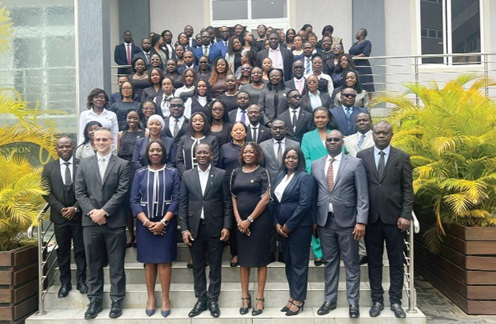
State attorneys will prosecute election crimes promptly — DPP
The Director of Public Prosecutions (DPP) at the Office of the Attorney-General, Yvonne Atakora Obuobisa, has expressed the commitment of state attorneys to prosecute election-related crimes with urgency, honour and in accordance with the law to ensure peaceful elections.
She said prosecutors had a duty to promote the national interest and ensure that election-related crimes were dealt with in tandem with the law to preserve the peace, unity and democracy of the country before, during and after the general election in December this year.
“We know that this is an election year; there will be multiple demonstrations, there will be election-related violence, and the urgency with which they come, our priority will be to play our roles as prosecutors with honour, decency, accuracy and urgency,” she said.
Speaking during the launch of the guidelines for plea bargaining and a training programme for state attorneys, the DPP urged prosecutors to work hard and continue to sacrifice for the country, describing their work as a “noble calling”.
“We must be willing to work at odd hours when the exigencies of the time demand us to do so, and to be fully prepared and formidable to the core.
“Ghana must have peaceful elections, and so we as prosecutors must play our part,” she added.
The four-day training programme, which was also used to launch the plea bargaining guidelines, is being held at Kwahu Nkwatia in the Eastern Region, and has attracted state attorneys who deal with criminal cases from all over the country, and other law enforcement agencies such as the Economic and Organised Crime Office (EOCO) and the Narcotics Control Commission.
Plea bargaining guidelines
The plea bargaining guidelines developed by the Office of the Attorney- General, with support from the US State Department, serves as a reference point on plea bargaining for prosecutors, lawyers and other stakeholders in the criminal justice system.
It provides a standardised framework on plea bargaining and is meant to also promote uniformity, fairness, transparency and eliminate unlawful acts in plea bargaining negotiations across the country.
Plea bargaining, which allows accused persons who admit their guilt to enter negotiations with prosecutors for some form of reprieve, became part of the criminal justice system of the country following the enactment of the Criminal and Other Offences (Procedure) (Amendment) Act, 2022 (Act 1079) in 2022, which amended the Criminal and Other Offences (Procedure) Act, 1960 (Act 30).
Under Act 1079, an accused person or his lawyer can initiate plea bargaining negotiations with a state prosecutor, who will need authorisation from the Attorney-General or the DPP or his supervisor before opting for the plea bargaining negotiations.
Plea bargaining comes in three forms — charge bargaining, which allows a change of a serious charge for a lesser charge; non-prosecution bargaining, where charges are either not filed against the accused person or the charges are withdrawn; and sentencing bargaining, which allows a reduction in the punishment for an accused person.
Plea bargaining is allowed in most cases, except in public electoral offences, high crime, treason, genocide, murder, rape, defilement, robbery, kidnapping, piracy, hijacking and abduction.
The guidelines provide information on what factors state attorneys must take into consideration before entering plea bargaining negotiations or withdrawing from it, the format of plea negotiations, what a plea agreement must entail, and how a state attorney can conduct plea negotiations.
Integrity
Launching the guidelines, a Deputy A-G, Alfred Tuah-Yeboah, urged state attorneys to continue to perform their work with integrity and fidelity.
Plea bargaining, he said, was not meant to pervert justice in the interest of some people, and therefore, called on state attorneys to stick to the guidelines and apply the law religiously without fear or favour.
“I know state attorneys are men and women of integrity. Make sure that you keep the law, because if you compromise your integrity once, you have done it forever .
We are supposed to do justice and not pervert justice. The guidelines should not be an excuse or should not be used as a springboard for the evasion of justice,” he added.
Justice
Mr Tuah-Yeboah warned that plea bargaining was not a licence to commit crime as the law was not meant to circumvent justice, and would therefore not be used to shield anyone.
He said the law was designed with many layers of accountability to ensure that it was not abused and used in favour of those who did not deserve reprieve under plea bargaining.
“The application of plea bargaining should not be seen as an attempt to undermine justice. In appropriate cases, where the law needs to be applied, the law will be applied; in other cases, the law will not apply,“ he said.
Writer’s email:
